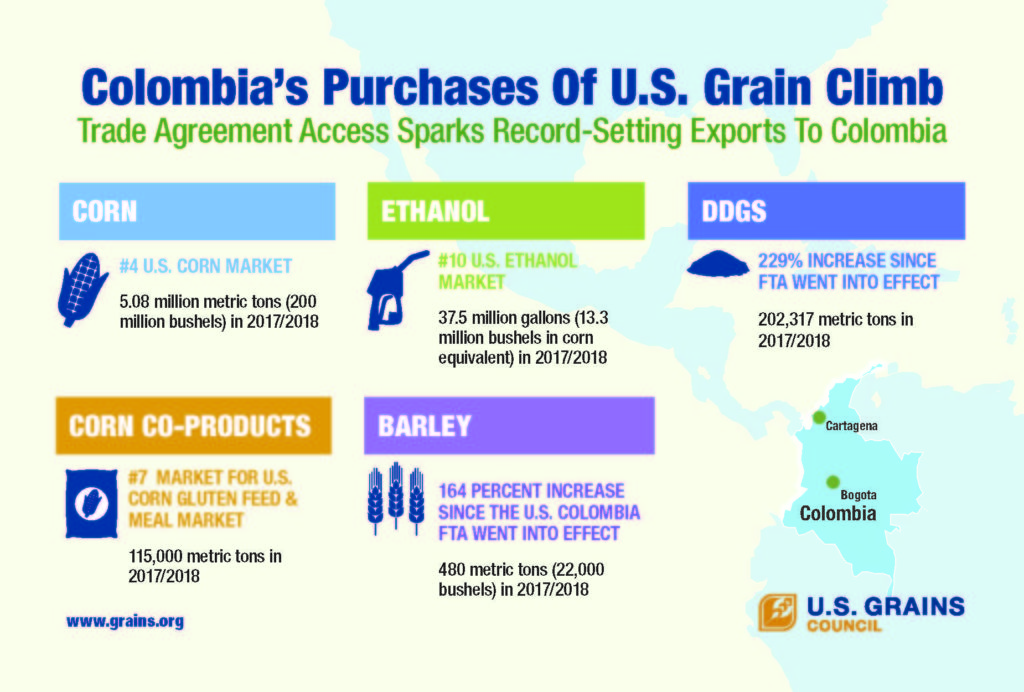CORN BLOG by Stacy Mayo-Martinez, Dir. of Industry Relations
Why Colombia? Kansas Corn farmers, staff work to build export markets
Kansas Corn Commission leaders and staff traveled to the U.S. Grains Council International Marketing Conference and Annual Membership Meeting in Colombia in February. We have had a few questions about why the meeting is in Colombia, so we pulled together some information to help explain the importance of Colombia to our US corn, distillers grains and ethanol markets.
The U.S. Grains Council is one of our partners focused on growing demand for corn products globally. USGC is an independent organization that is funded through a variety of sources, such as commodity organizations, to focus on expanding international markets for corn, barley, grain sorghum and their products, especially distillers grains and ethanol. The Kansas Corn Commission has partnered with and invested in USGC for many years and have seen the work pay off in a number of different markets. Colombia is a target market for the USGC Western Hemisphere advisory team as they are currently the 4th largest importer of US corn and 8th largest importer of US ethanol. (17/18 marketing year)

Feeding a growing market
While Colombia is already an important customer, USGC estimates the biggest growth potential for feed grains in the country are the poultry and swine sectors. This growth in the livestock sector will come from a steady growth in protein consumption as a result of urbanization and population increase. Corn imports are projected to continue to grow; USGC projects 9 million metric tons by 2030. That’s 354 million bushels. Wait, Colombia only currently imports 5.08 MMT of corn from the United States? Yes, we realize that’s a big jump to make in 11 years, but that would mean Colombia would become our third largest importer of corn. It seems achievable when you realize sales are alread
up 20 percent compared to the previous marketing year.
Through attending these meetings in Colombia, the team hopes to learn more about this growing market, but also work on building relationships with the companies that are buying of corn and corn products. While the USGC staff has been stationed in Colombia for years and working with these local grain buyers already, it’s important for those that want to buy a high-quality consistent grain product from the U.S. get to know our farmers and the organizations working on their behalf to build the markets. Relationships are not built overnight, and through previous trips, such as the USGC Mexico trade mission in 2017, we’ve learned how crucial it is to work with these important customers.
Why do we need these relationships? In the days of rapidly changing trade policy agreements, we need to have advocates for trade agreements in the countries. Yes, we have our USGC staff, but like the work we do in Washington D.C. on behalf of American farmers, we need to have international grain buyers as allies that can advocate to their governments the importance of purchasing U.S. grain at a fair market value without import taxes.
Fueling a growing market
Currently, Colombia has a domestic supply of sugar cane-based ethanol, and they currently produce roughly 450 million liters, or 118.89 million gallons, per year to supply the country’s E8 blend mandate. However, they are working toward a blend goal of E10.
In 2015/16 Colombia imported roughly 25 million gallons of ethanol and the U.S. filled roughly 4 million of those gallons. In 2016/17 they imported a total of 38 million gallons and the U.S. increased our exports to 19 million gallons to meet 50% of that import amount.
With a rising domestic income and population, the country is likely to also see an increase in vehicle ownership and therefore fuel-use increase. The biggest hurdle for further growth with ethanol exports is concerns around how policies are written to exclude corn-based ethanol because of carbon footprint. Working with the Colombian import policies is key focus for the USGC staff in country. The current comparison between sugar-based ethanol and corn-based ethanol is an issue with inaccurate or bad modeling that we continue to face in other countries too. We have the correct data to work toward a better solution for corn-based ethanol exports to Colombia.
Learning, voting and providing insights
In addition to learning more about the Colombian market, the commissioners and staff will attend and participate in the advisory team meetings to get updates from initiatives around the globe and also vote on any changes that come before the body. Four of the attendees sit on various USGC advisory teams representing Kansas Corn:
- Brian Baalman, Menlo farmer, Ethanol Advisory Team
- Dennis McNinch, Utica farmer, Trade Policy Advisory Team
- Steve Rome, Hugoton farmer, Asia Advisory Team
- Greg Krissek, Kansas Corn CEO, Middle East/Africa Advisory Team.
Also, attending will be Terry Vinduska, U.S. Grains Council past-chairman and Marion farmer.
If you have any questions about the U.S. Grains Council, the Colombian markets or how you can get involved in supporting the growth of trade for corn in all forms, feel free to reach out to the staff at Kansas Corn. My email is smartinez@ksgrains.com or through our office at 785-410-5009.
